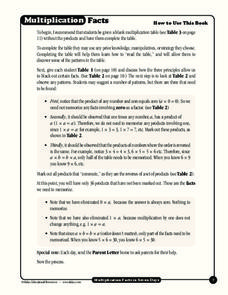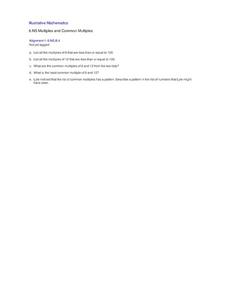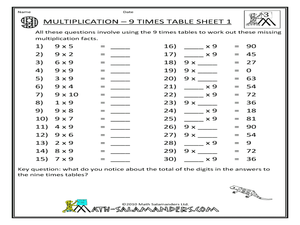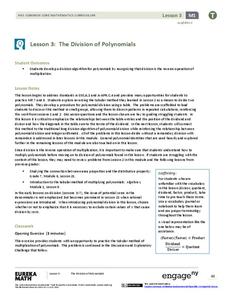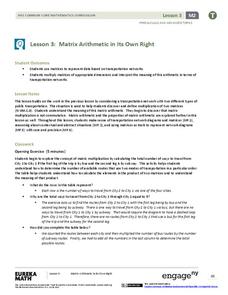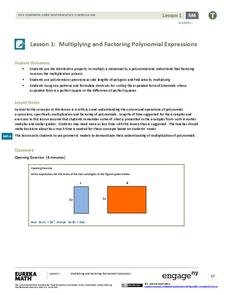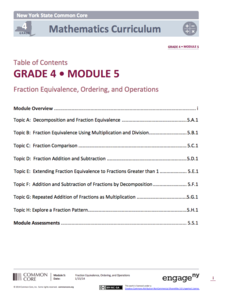Santa Barbara City College
How to Make a Multiplication Table
Teach children how to make a multiplication table, and they'll be multiplying for life. Following this series of steps, young mathematicians learn to use patterns and the relationships between numbers to create...
K-5 Math Teaching Resources
Multiplication Chart
This is not your run-of-the-mill multiplication chart. Going beyond the standard 12 x 12 limit, this resource includes multiplication facts up through 12 x 20, making it great for supporting children as they continue working toward being...
EngageNY
Multiplication of Numbers in Exponential Form
Develop a solid understanding of multiplication and division properties of exponents. Individuals expand exponential terms to discover the patterns and create the properties in the second installment in a series of 15. The activity...
Didax
Multiplication Facts
Learning their multiplication facts is a big step in the education of young mathematicians. Help achieve this goal with the support of this collection of instructional materials.
San Jose Unified School District
Multiplication Chart
Looking to support your young mathematicians with mastering their multiplication facts? Then this set of multiplication charts is a great place to start, allowing children to visualize the the relationships between factors and multiples.
CK-12 Foundation
Multiplication of Monomials by Polynomials: Distributing the Monomial
An interactive shows graphically the distribution of a monomial across all the terms in a polynomial multiplication problem. Pupils relate the specific example to a more general problem then make conclusions to develop a pattern for...
EngageNY
Writing and Evaluating Expressions—Multiplication and Division
Don't table the resource on writing expressions for relationships in tables. Scholars investigate relationships between variables and write algebraic expressions involving multiplication and division. These expressions help solve...
Math Salamanders Ltd.
Multiplication As Repeated Addition
In this understanding of multiplication as a repeated addition worksheet, students convert repeated addition facts to multiplication facts and find the products. Students solve 30 problems.
EngageNY
Multiplying and Factoring Polynomial Expressions (part 2)
If you can multiply binomials, you can factor trinomials! This is the premise for a lesson on factoring. Pupils look for patterns in the binomials they multiply and apply them in reverse. Examples include leading coefficients of one...
CK-12 Foundation
Multiplying Matrices by a Scalar: Making Matrix Patterns
Scalar multiplication equations can be a drag. Scholars determine missing matrices to make correct scalar matrix multiplication equations. They place the correct matrix into the equations within the interactive resource and analyze the...
Math Salamanders Ltd.
Multiplication as Repeated Addition to 10x10
The class works to change 15 repeated addition problems into their multiplication counterparts and then completes 15 more where they do the opposite. This is a great way to build an understanding of what multiplication is and could...
Curated OER
Symmetry of the Addition Table
Help your class discover the commutative property of addition with this exploration of the addition table. By folding and coloring the table, a symmetry is found that directs students to an understanding of this crucial mathematical...
Illustrative Mathematics
Multiples and Common Multiples
Learners are asked to find multiples and common multiples of two numbers. They must take their findings and find a pattern between the numbers and explain their reasoning. Use this resource with The Florist Shop activity in this series...
Math Salamanders Ltd.
Multiplication - Nine Times Table Sheet 1
In this multiplication-nine times table learning exercise, students use the 9 times table to work out the missing multiplication facts in 30 problems, then observe a pattern in the total of the digits.
Math Salamanders Ltd.
Multiplication - 5 Times Table Sheet 1
In this multiplication learning exercise, learners use the five times table to solve thirty multiplication problems, then observe the ones digit in the five times table for a pattern.
EngageNY
The Division of Polynomials
Build a true understanding of division of polynomials. Learners use their knowledge of multiplying polynomials to create an algorithm to divide polynomials. The area model of multiplication becomes the reverse tabular method of division.
EngageNY
Matrix Arithmetic in Its Own Right
Matrix multiplication can seem random to pupils. Here's a instructional activity that uses a real-life example situation to reinforce the purpose of matrix multiplication. Learners discover how to multiply matrices and relate the process...
EngageNY
Multiplying and Factoring Polynomial Expressions (part 1)
Polynomial multiplication and factoring go hand in hand. Why not teach them together. This resource begins with an area model for distributing a monomial and then connects the process to factoring the GCF. Learners then advance to...
World Wildlife Fund
Take 6
Investigate the various properties of the number six with this elementary math lesson. From simple addition, subtraction, multiplication, and division problems to the creation of hexagonal tessellations, this lesson covers all aspects of...
CK-12 Foundation
Multiplying Polynomials
Help your class find patterns in polynomial multiplication. Pupils multiply a trinomial by a binomial using a graphic organizer. They respond to questions about patterns observed in polynomial multiplication before a discussion question...
EngageNY
The Multiplication of Polynomials
If you can multiply multi-digit integers, you can multiply polynomials. Learners use an area model to compare multiplying numbers to multiplying polynomials. They progress to using the distributive property.
EngageNY
Writing and Evaluating Expressions—Multiplication and Addition
How many people can sit around a table? The 22nd part in a series of 36 continues the work on writing and evaluating expressions to include expressions with two operations. Pupils use models to determine an expression for the number of...
EngageNY
Even and Odd Numbers
Even or not, here I come. Groups investigate the parity of products and sums of whole numbers in the 17th lesson in a series of 21. Using dots to represent numbers, they develop a pattern for the products of two even numbers; two odd...
EngageNY
Fraction Equivalence, Ordering, and Operations
Need a unit to teach fractions to fourth graders? Look no further than this well-developed and thorough set of lessons that takes teachers through all steps of planning, implementing, and assessing their lessons. Divided into eight...



